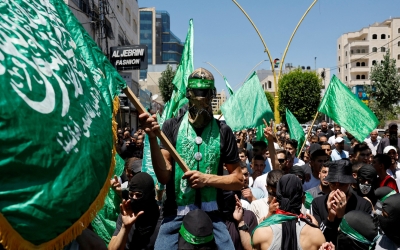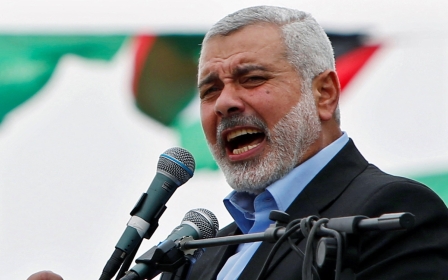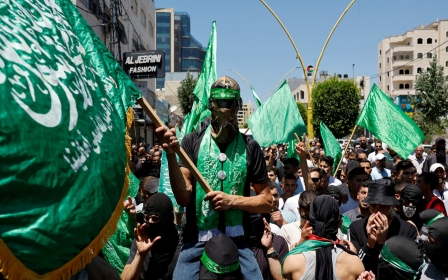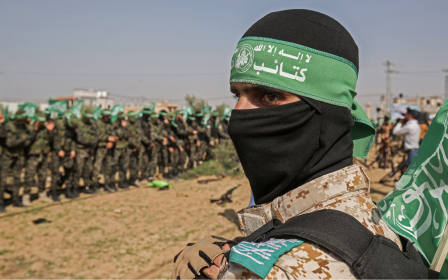Ismail Haniyeh killing: How will the 'Axis of Resistance' respond?
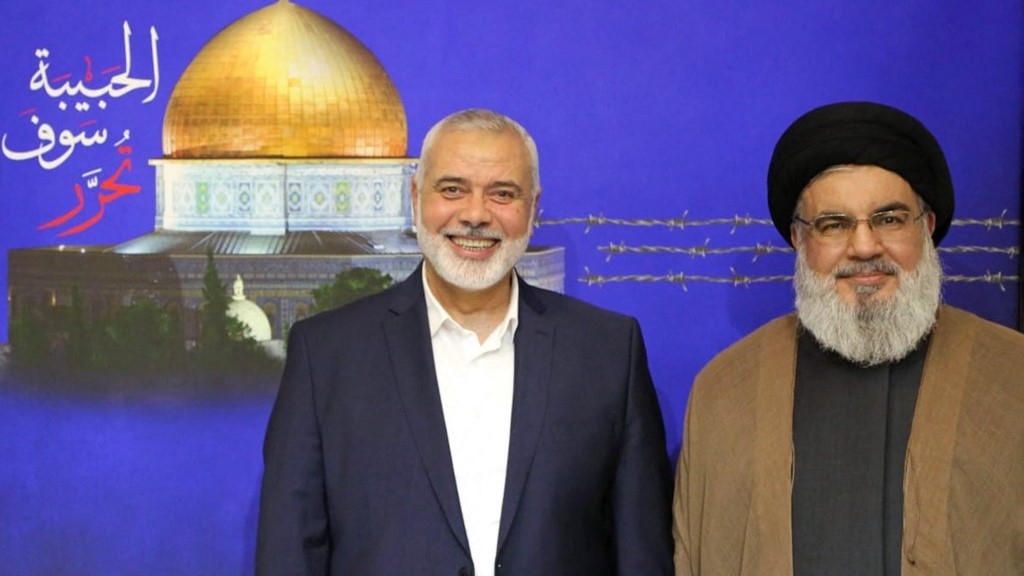
The shock assassination of Hamas leader Ismail Haniyeh in Iran on Wednesday has provoked an outpouring of condemnation and threats of revenge from across the Middle East.
Members of the Iranian-led "Axis of Resistance" anti-Israel alliance, including Yemen's Houthis, Hezbollah in Lebanon and the numerous paramilitaries in Iraq, have promised retribution for the killing.
Iran has also, for its part, said that it would not allow the apparent Israeli attack in its capital city go unpunished.
"Following this bitter, tragic event which has taken place within the borders of the Islamic Republic, it is our duty to take revenge," said Iran's Supreme Leader Ali Khamenei.
Since the 7 October Hamas-led attack, other members of the Axis of Resistance have attacked Israel in solidarity with the Palestinian movement and people under Israeli fire in Gaza, where at least 40,000 people have been killed.
New MEE newsletter: Jerusalem Dispatch
Sign up to get the latest insights and analysis on Israel-Palestine, alongside Turkey Unpacked and other MEE newsletters
Hezbollah has been engaged in non-stop, low-level clashes along the Lebanese-Israeli border that have nonetheless been escalating for months. On Wednesday, Israel also assassinated Hezbollah commander Fuad Shukr in Beirut.
Meanwhile Ansar Allah, as the Yemeni Houthi movement is officially known, and Iraqi paramilitaries have fired rockets and drones at Israel, and disrupted shipping along the Red Sea, targeting ships the Houthis say are Israeli-linked.
Iran itself staged a massive drone and missile attack on Israel in April after an Israeli strike on the Iranian consulate in Damascus killed several senior Iranian Republican Guard commanders.
Israel and its allies downed the vast majority of those drones and missiles, but it nonetheless marked the first time Tehran targeted Israeli soil.
Coordinated response?
It remains to be seen what kind of action the Iran-led alliance will take in response to Haniyeh's death, as well as Shukr's killing in Beirut.
Abdolrasool Divsallar, senior researcher at the United Nations Institute for Disarmament Research, said a "coordinated" response from Iran and its proxies could be on the cards as a means of upping the stakes.
"I think what's important is the quantity and scale of the response and level of coordination, and I think we've not seen a coordinated attack against Israel at the same time," he told Middle East Eye.
Iran's attack on Israel in April was designed to show a response from the Islamic Republic, but in practice it caused no casualties and minimum damage.
But a precedent had been set, and a direct attack on one of the most senior Palestinian political leaders in Iran - there as a guest for the new president's inauguration - is another matter.
"I think in this case it can go one of two ways," said Seamus Malekafzali, an Iranian-American writer specialising on Iran.
"If the coverage from the media and from politicians focuses on Haniyeh as a martyr and that his blood will be avenged, but strays away largely from mentions of sovereignty, then I think [Iran] may be content to respond through supporting the actions of Hezbollah or the Yemenis or so on," he added.
"However, if talk starts surrounding discussions of land, of sovereignty being violated, therefore honing in on concerns of national pride and patriotism, that expands beyond allyship with the Palestinians, then they may in fact do something directly."
Regional attacks
The killing of Haniyeh came hours after Shukr's assassination in a drone strike in Beirut, which Israel said was in response to an attack in the occupied Golan Heights that was blamed on the group and killed 12 children. Hezbollah denies it was responsible.
Also on Tuesday night, the Iraqi government said the US-led coalition established to fight the Islamic State group had launched a strike on a base belonging to the Hashd al-Shaabi, the paramilitary forces that include many Iran-backed armed groups.
In a statement, the Popular Mobilisation Authority - the government body that oversees the Hashd - drew a direct link between the attacks.
'I think the 'Axis of Resistance' has to respond in some way. If it doesn't, I think it jeopardises the purpose of the alliance'
- Seamus Malekafzali, journalist
"The coincidence of this attack with the criminal operation carried out by [Israel] to assassinate the martyred brother, leader Ismail Haniyeh... exposes the enemies' plans to ignite the region and expand the circle of war and aggression," said the statement.
Kataeb Hezbollah, one of the most powerful Iraqi paramilitaries which make up the Islamic Resistance in Iraq - a coalition formed to target Israeli and US interests last year - also said on its Telegram channel that the attack on Tehran broke "all rules of engagement".
The brazeness of Wednesday's attack in Tehran has, in particular, drawn attention. While Israel has carried out targeted assassinations in Iran before, usually of nuclear scientists, it has tended to be more low key, in the form of poisonings or shootings which Israel can avoid responsibility for if needed.
A source close to officials in the Iranian presidency told MEE that Haniyeh was staying near Tehran's Saadabad palace, which is used by the president's office, when he was killed. The area was heavily guarded by the Republican Guard, the source added.
"I think the Axis of Resistance has to respond in some way. If it doesn't, I think it jeopardises the purpose of the alliance," said Malekafzali.
"When Hamas is said to be negotiating on behalf of the Axis by Hezbollah leader Hassan Nasrallah and by others, and then the leader of Hamas is killed, in Iran, in such a brazen manner in what appears to have been either an air strike or a missile strike, not just a simple assassination, then you must do something - or else Israel will know that red lines it may have thought existed before actually don't exist."
Intelligence failings
Much of the discussion around the likely response from Iran and its allies is speculation.
But the attack has raised concerns about the ability of Iran to keep its allies safe during trips to the country, as well as the apparent major failure of the country's intelligence services.
'Escalating tensions are inevitable, and Iran’s non-response could damage its credibility among its allies'
- Hamidreza Aziz, analyst
Iranian foreign ministry spokesman Nasser Kanaani said on Wednesday that Haniyeh's death would "strengthen the deep and unbreakable bond between Tehran, Palestine and the resistance" - but not everyone is so sure.
Analyst Hamidreza Azizi said the attack showed "significant intelligence weaknesses across the resistance axis" and could end up sowing fears about the strength of the alliance, particularly if Iran failed to respond.
"Escalating tensions are inevitable, and Iran’s non-response could damage its credibility among its allies," he said.
Divsallar said the priority on all sides now should be for "communication" to limit any potentional fallout.
"There should be an international intervention, first to communicate with Iran to impact the proportionality of its reponse, but also communication with Israel to absorb the Iranian response," he said.
Middle East Eye delivers independent and unrivalled coverage and analysis of the Middle East, North Africa and beyond. To learn more about republishing this content and the associated fees, please fill out this form. More about MEE can be found here.


